#i love Sigfried
Note
Having a normal one I see
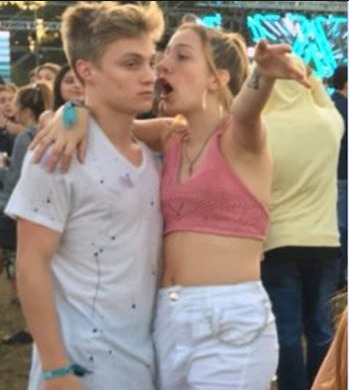
AND THEN SHE SAYS ESCAPE PODS STILL WORKING FINE... AND SIGFRIED FINALLY ANSWERS THEIR LOVE THEIR ONE THEIR ONLY THEIR HOME THEIR GIRLFRIEND THEIR SHIP AND REFUSES TO LET HER DIE TO SAVE THEM AND ALL BUT BEGS TO BE ALLOWED TO DIE WITH HER AND
#AND THIS I RECORDED BY THE IMMORTAL SPACE PIRATES#THAT JUST LOST ONE OF THEIR NUMBER TO THE SAME COLD SPACE THAT TOOK SIGFRIED#WHO LOVED THEIR SHIP LIKE SIGFRIED LOVED THEIRS#PROBABLY THE ONLY PERSON IN EXISTANCE WHO COULD HAVE UNDERSTOOD HER LIKE THEY UNDERSTOOD THEMSELF#AND NOW THEY'RE BOTH GONE#BOTH BECAUSE THEY COULDN'T LET THEIR LOVE GO#ONE AS SHE EXISTED IN LIFE#AND ONE AS SHE EXISTED AN ETERNITY AGO#AND IM SUPPSOSTED TO BE NORMAL?????????#the mechanisms
11 notes
·
View notes
Text
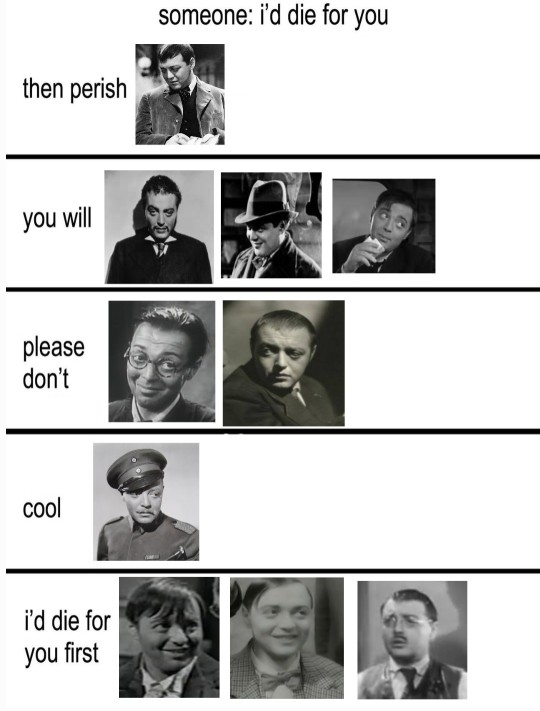
Pete characters from the 30s films I've seen
#i dont love all these alignment charts#but this is a good one so i intend to use it for all of petes characters#so far im going decade to decade#but ive seen so few of petes 50s and 60s stuff that i might combine the decades#peter lorre#m#hans beckert#the man who knew too much 1934#abbott#die koffer des herrn o.f.#stix#crack-up#crime and punishment#roderick raskolniknov#mr moto#the secret agent#the hairless mexican#lancer spy#sigfried gruning#was frauen träumen#otto fuessli#the things ill do out of boredom#mememes#Barron Rudolph Maximillian Tagger
16 notes
·
View notes
Text

Influencer AU Designs: Zara, Neve, Russet.
#oop meant to post these with the others but by the time I realized I had already pressed post...#I was trying to do characters with things in common but these three don't really have anything#more than anything I just wanted to draw zara and neve#and then russet because I did sig and I didn't really have anyone else to put him with#ignore russet's body and such I know I know I couldn't get it any better#zara is a biker neve works for rhys russet is a pilot#zara used to date clyde neve is in love with rhys (and juliet) russet is smitten with sigfried#hazbin hotel#influencer au#fan characters#zara#neve#russet
1 note
·
View note
Text
Oh, Sigfried... There's always more silver to be looted, but how to replace a brother?
#he giving the sword back to Erik? chef kiss#for a second I thought he would push the sword away but their love cannot be broken T.T#(only severely injured)(i would be so mad if i was sigfried)#tlk blogging
1 note
·
View note
Text
In It For The Long Haul (Doctor Who)

Tenth Doctor x GN!Reader / requests are open and encouraged
Summary: Almost dying repeatedly will wear anyone down eventually, and you're not sure how much more of this you can take.
CW: anxiety, nail picking, angst, comfort, sprinkle of fluff
DW tag list: @nyxiethesimp @quickslvxrr (send an ask to be added to a tag list!)
___ ___ ___ ___ ___
Spending day after day with the Doctor could be incredibly easy. Travels throughout time and space, meeting aliens, seeing new planets and visiting markets and things. Those were the easy days. The soft days. The hard days, well, they almost broke you sometimes.
The hard days were filled with kidnappings, murders, weeping mothers and danger lurking around any and all corners. You never knew what monster was going to pop out of what closet, or whether you were going to meet your end that day. And eventually, as that sort of thing would do to a person, it wore you down.
Today, well, you weren’t sure you were going to make it. The Doctor was so used to this kind of thing day in and day out that you supposed he didn’t need to process it the same way you did, and the more you needed to press your memories back and bottle it all up, the more that tight ball of anxiety grew inside you, threatening to burst out and take you with it.
The Doctor held his psychic paper in his hand, slapping it against the other thoughtfully. He’d received another message. Someone else who needed help. You wanted to help them. You really did. And you wanted to be there with the Doctor- side by side as you saved people and kicked alien ass. However, at the same time, the two of you had faced down at least three, maybe four, terrifying potentially fatal situations this week alone and, well, you were getting close to your breaking point.
You were tired and overwhelmed.
You could tell just by looking at the Doctor that he was gearing up for an adventure. It was really horrible of you to think, but, well… if they were suffering and asking for help at a specific point in time- you could always wait a while and travel back to that point later. The caller would never know. You weren’t talking years or anything, just a few days. Even just a day.
As soon as the thought crossed your mind, you regretted it. You felt a wave of guilt wash over you, causing you to lean back against the TARDIS wall and sigh defeatedly. She seemed to hum from behind you, trying to give you a little comfort. Oh, you needed a vacation. And not a vacation where as soon as you get there the Doctor finds some alien threat to investigate or some bomb to diffuse. A real, honest-to-God vacation. Or you’d be the bomb the Doctor had to diffuse.
“What do you think, eh? Up for another adventure?” The Doctor finally turned to you, a massive grin spread on his face. Upon seeing whatever expression was plastered on your own, his brows dropped down into concern. He hummed and within seconds had bounded over to where you were standing in the corner. “What’s wrong, love? Was it the crab? I never trust the crab from Sigfried Xena. Bit too… purple for me.”
You let out a chuckle despite yourself. No matter what mood you were in, the Doctor always made you laugh. Whether it was intentional half the time was up for debate, but still. He made you laugh all the same.
“It’s- it wasn’t the crab,” you say, biting your lip anxiously, looking at the tops of your shoes. The Doctor’s warm hand is suddenly over your own, and you realise that you’d been picking at your nails. A habit you’d formed when stressed or anxious. You were pretty sure that’s why you let them grow out sometimes. A steadying sigh leaves your lungs and you risk a look back up to the Doctor.
“What’s wrong?” He asked pointedly, giving you one of those arched brow looks that always pulls you out of your shell.
“I don’t think I can do this.” The admission is so quiet you could barely hear it yourself. But the Doctor heard it. Of course, he does.
“Do what?”
You can tell he’s fighting the urge to say something to make you laugh. He can see you need to get this off your chest.
“I don’t think I can go off on another dangerous adventure,” you breathe. “It’s not that I don’t want to, but, I’m- I can-” you let out a frustrated groan as the words refuse to form for you. The Doctor’s eyes are flitting between yours as if he understands perfectly and doesn’t understand a word at the same time. Then again, you were pretty sure that was just his permanent state of being anyway.
“I almost died this week,” you say exasperatedly, feeling around the words and forcing them out. “Four times. And not in a cute oh-yeah-that-maths-homework-almost-killed-me kind of way. I almost actually died, Doctor. Four times. This week alone.” You knew he knew this, but you couldn’t regenerate. One bad shot from a gun, or a Dalek’s laser and it was game over for you.
Being put in these situations over and over were starting to wear you down. The almost constant fear was starting to grate against your insides like sandpaper.
The Doctor hummed for a second. You were almost certain this had been the most quiet he’d ever been. It was concerning.
“I can’t leave whoever this is- they need help,” the Doctor said eventually, choosing his words. “I know you’re not asking me to stand by and let them suffer, but I can’t leave them. It’s not who I am.”
You nodded, fingers grasping around the hand he has on yours so you didn’t start with your nails again.
“How about this?” The Doctor says, using his free hand to raise your gaze back to him by your chin. “You can come, or you can sit this one out. The TARDIS will keep you company while I’m gone- and then when I get back, I’ll take you home.”
You start to interrupt, but the look he gives you tells you to let him finish.
“We can visit your family- oh, I dunno- have dinner or something, and then you can either come with me to the next great adventure, or you can stay. I won’t be upset.” You know this is a lie. Of course, he’d be upset. “Well, I’ll understand,” he corrects.
You chew on your lip, peering into his eyes as if you’ll finally be able to decipher the thoughts going on behind them there.
“One condition,” you say after a few moments, settling on a decision. “You take me dancing first- after the problem is dealt with that is,” you tack on quickly, waving at the psychic paper.
“And I’m coming with you to help whoever that is. I might be overwhelmed, but I can’t stand by either.”
“Oh, yes,” he says softly, stretching back into that grin that melts hearts. “I think I can manage that.”
He presses a kiss to your forehead, grasps one of your hands in his, and puts his other around your waist. You giggle freely as he leads you both back to the console of the TARDIS and lets go with an almost giggle of his own.
“I don’t think I’ve ever told you how much I love dancing. Brilliant stuff, that is. Good for the soul. Alright, then,” he looks positively giddy, rubbing his hands together. “First stop Earth- 1746.” He starts booting the TARDIS up and organising the coordinates.
“Allons-y!”
#A/N: not me ripping at the tops of my nails every time im anxious or stressed rip#love that for me#david tennant#doctor who x reader#tenth doctor#tenth doctor x reader#doctor who#doctorwho#doctor who fic#doctor who fanfiction#david tennant x reader#10th doctor#10th doctor x y/n#10th doctor x you#10th doctor x reader#tenth doctor x y/n#tenth doctor x you#doctor who x y/n#doctor who x you#ten x reader#ten x y/n#ten x you#the doctor#the doctor x y/n#the doctor x you#the doctor x reader#david tennant doctor#dt doctor#allons-y
174 notes
·
View notes
Text
Perfect Blue, Black Swan, and Birdman
It is common knowledge that Perfect Blue and Black Swan have cinematic and thematic similarities. I'd like to argue Birdman (2014) shares just as much with these other two films. Outlined below are some of the most notable commonalities.
The Art Imitates Their Real Life:
This is the major narrative device shared by all three films. The protagonists are all artists playing a role in a performance; Mima: a TV actor, Nina: a ballerina, and Riggan: a thespian. They are unaware of how closely the plight of their characters mirrors their own struggles. While pushing themselves to perform better, the line between their reality and the story they are performing starts to blur.
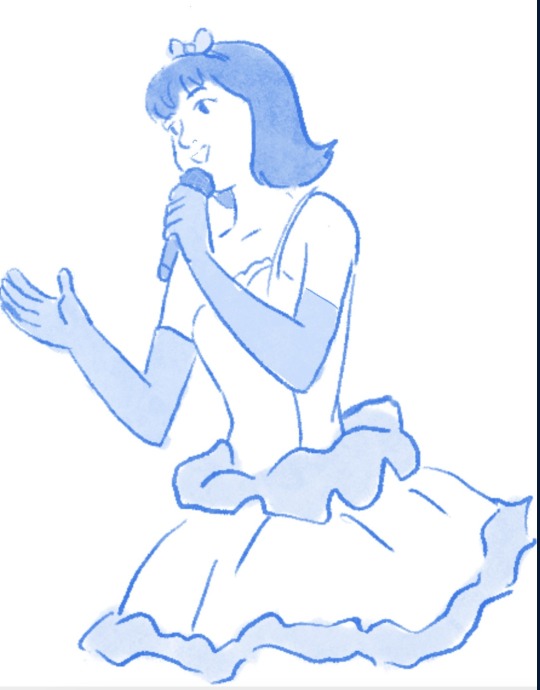
-Perfect Blue:
The Reality:
Mima is trying to make the leap from pop idol to actor. She has a “bit part” at first in the TV show Double Bind, but her manager Mr. Tadokoro campaigns for her to have more screen time. The producers agree, but it involves taking on a role that exploits her sexually. Mima's conflict with her old self and new self tear her apart. Those working on the show around her start getting murdered.
Notable moment: This scene especially highlights the overlap:
Mima is sitting in a chair with the doctor, it appears they are shooting a scene in Double Bind.
Doctor: Can you tell me your name?
Mima: Me? I'm Mima Kirigoe.
Doctor: Okay. And what do you do?
Mima: I'm a pop idol... no, an actress.
Doctor: That must be hard work.
Mima: It's hard, but it's what I chose to do.
We pull back to see detectives watching through a double-sided mirror.
Detective: She thinks she's a new young actress named Mima Kirigoe.
The doctor comes out and joins the detectives.
Doctor: Dissociative Identity Disorder. In other words, "multiple personality syndrome." All those crimes took place when she was some other persona.
Detective: So where's the persona of the original Yoko?
Doctor: Yoko Takakura, the original persona.....is nothing more than a character in a drama for her. Being a "normal" girl... how she was raped in a strip club. Everything happened as part of her drama series. By doing so, she salvaged her heart.
Mima presses her face into the mirror.
Mima: That's right. I'm an actress.
Director: Cut!
The footage rewinds. Mima is sitting in a chair with the doctor, it appears they are shooting a scene in Double Bind.
Doctor: Can you tell me your name?
Mima: Me? I'm Rika Takakura.
The doctor comes out and joins the detectives.
Doctor: The original persona, Yoko Takakura, no longer exists. By killing, and later becoming, her sister the top model, she salvaged her heart.
Mima presses her face into the mirror.
Mima: That's right. I'm a model.
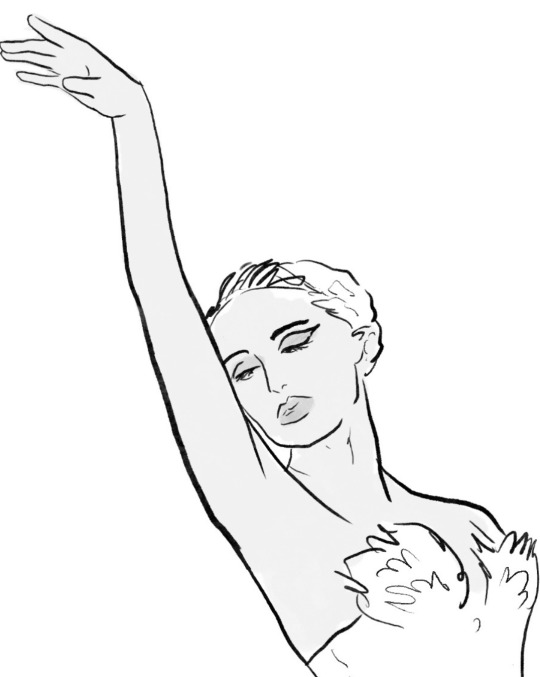
-Black Swan:
The Story:
Thomas: We all know the story: virginal girl, pure and sweet, trapped in the body of a swan (Odette). She desires freedom, but only true love can break the spell. Her wish is granted in the form of a prince (Sigfried). But before he can declare his love, her lustful twin, the Black Swan (Odile) tricks and seduces him. Devastated, the White Swan leaps off a cliff, killing herself. But, in death, finds freedom.”
The Reality: Nina is auditioning for the lead role in Swan Lake, a dual performance as White Swan and Black Swan. In an out-of-character moment, she wins over the director Thomas, and lands the role. A fellow ballerina, Lily, visually similar but a dancer in every way Nina is not, catches the eye of Thomas and to a lesser extent, the man playing the actual prince. Nina isn’t interested in the prince, but it’s still a blow to her ego. At the end of opening night she likely dies of a self-inflicted wound.
Notable moments:
1) In the ballet (but not featured in the film’s adaptation), there is a ball for the prince with all the eligible bachelorettes in the kingdom. At this point, the prince has already met Odette at the magic lake, but before she can arrive, Rothbart's (Evil Sorcerer, the reason Odette is a swan) daughter Odile appears disguised as Odette and tricks him into falling in love with her.
In the film, this is recreated by Lily stepping in for Nina when she oversleeps one morning. She plays Nina’s role beautifully, and Thomas finds himself moved by her performance. When Nina arrives and takes back performing her role, she sees Thomas’s eyes stray from watching her to look at Lily.
2) Thomas shouts this to Nina as she rehearses the finale:
Thomas: The Final Act. Your Final Dance. You’ve tasted your dream. Touched it. Only to have it crushed. Your heart is broken, wounded. Your lifeforce fading. The blood drips. The Black Swan has stolen your love. There's only one way to end the pain. You're not at all fearful. Filled with acceptance. You look down at Rothbart, and then at the Prince, and, yes, up at the audience...And jump!”
This is foreshadowing the finale of the ballet and the events of the film. Nina, in full delusion, thinks she’s tussled with and killed Lily in her dressing room, but has actually stabbed herself with glass. With the shard deep in her own belly, Nina performs the finale, gracefully gesturing to her prince, Rothbart, and her mother, every line Thomas shouted to her all the more true. Then she jumps.
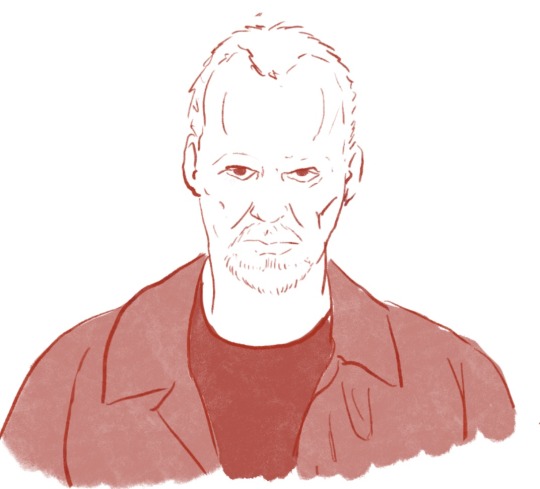
-Birdman
The Reality: Riggan confuses adoration with love, but in many ways so do his fellow actors, all craving a similar validation through acting. Off the stage, their lives are messy, especially their romantic ones. Most off-stage conversations are often philosophical ones.
Riggan's is the least obvious because the source material is lesser known and less developed to the audience, but the story he's performing as a whole doesn't matter so much. Mike even comments in a fit during their first preview about how Riggan's adapted the work. (Riggan is the writer, producer, and star)
Mike: This is Carver, man! The guy lost a piece of liver every time he wrote a page! If I’m supposed to drink gin then bring me fuckin gin! I mean, you fucked the time period! You took all the good lines for yourself!"
The scenes chosen for us to see demonstrate the clear overlap between “What We Talk About When We Talk About Love" and Riggan's life.
Notable examples:
1) Riggan’s girlfriend and fellow performer Laura’s character has a monologue in the play:
Laura: In the days before Nick’s depression really started to eat away at him, he had no idea I was pregnant. And I never intended on telling him. I guess we make choices in life, and we choose to live with them. Or not. I didn’t want that baby... Not because I didn’t love Nick. And not because I didn’t love the-- The idea of it. But because I just wasn’t ready to love myself.
Before we see her perform this the first time, Laura tells Riggan she might be pregnant. The second time is after she confirms she is not. Laura wants a baby, but based on Riggan’s reaction he isn’t into it.
2) Riggan (as Ed) barges in on Lesley (as Terri) and Mike (as Mel) in a hotel room. Terri left Ed for Mel and Ed has hunted them down to confront his ex.
Riggan: What's wrong with me? Why do I end up having to beg people to love me?
Lesley: Ed. Eddie. Please... Give me the gun. Just look at me. I was drowning. I was not capable of-- You deserve to be loved. You do.
Riggan: I just wanted to be what you wanted. Now I spend every fucking minute praying to be someone else. Someone I'm not. Anyone…
This scene from the play is portrayed as the finale, and we see it performed three times. Riggan is desperate in his quest for love and validation, unaware that he is searching for it in the wrong places, like chasing after an old lover. It's relevant that Mike is his ex's new lover (in the play). Riggan is envious of him, his acting ability, and the respect and notoriety he has in the industry. Also, how he can quickly connect with his daughter (who Riggan is somewhat estranged from).
In the play, Ed at first wants to kill his wife's lover Mel, and maybe his ex-wife, but in the end he turns the gun on himself. On opening night Riggan uses a real gun and shoots himself in the head.
The Shadow Self:
-Perfect Blue: A pop Idol was something Mima strived to be, but her group CHAM is stagnant. Mima, with the encouragement of one of her managers, decides to change careers to be an actress. It’s unclear how much of it was Mima’s idea, but she commits. Mima privately struggles through this change, and the chorus of upset fans and doubtful industry folks don't help. This triggers Mima’s "old self” AKA "Pop Idol Mima" to start appearing, often during moments when Mima struggles with the sexual aspects of her new career. Pop Idol Mima is forever in her frilly pink get-up from the opening number of the film, frozen in time, perfect and pure. Pop Idol Mima resists and criticizes Mimi’s changes.
It isn’t revealed until the end of the film that Mima’s “shadow” is one of her agents, Rumi. This is in regards to the “Mima” that is communicating to her stalker and controlling the content of the website “Mima’s room.” Together they post intimate details and thoughts from “Mima” herself. The apparition of Pop Idol Mima she sees following her is only Rumi some of the time and mostly is Mima hallucinating in moments of emotional distress.
-Black Swan: It’s not a coincidence that Nina, dressed in pastels and a white feathery scarf, spies a woman on the train who looks just like her, but in black, on her way to the first day of the new ballet season. We are actually seeing Lily (Mia Kunis, a fellow dancer) for the first time on the train, but this is also the moment when Nina sees her first glimpse of "Black Swan Nina", the part of herself that she is not in touch with.
Nina is challenged to find her inner black swan, because as the lead she must play both the white and black swan characters. As she pushes herself, she sees Black Swan Nina inflicting self-harm, on the faces of other dancers or Lily. The lines between Lily and Black Swan Nina are often blurred, but there is doubt as to whether she's even seeing Lily during Black Swan Nina moments.
-Birdman: Right away we hear the gravelly voice of Birdman talking to Riggan, but we don’t know who it is yet. Birdman is the superhero character he is most famous for playing. Birdman berates him over his choice to leave the role behind throughout the film, enticing him to get some plastic surgery, work out, and get back into the suit to start making real money again. Birdman openly acknowledges that he is a voice in Riggan’s head, only physically appearing twice in the movie in moments where Riggan is most in his delusions and imagining he can fly.
The Rival / The Double:
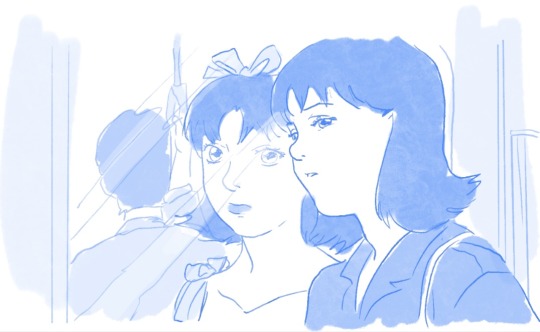
-Perfect Blue: Mima’s rival is mostly her shadow self, Pop Idol Mima. In the acting world, she has no one she is directly competing with. Her former bandmates are doing better since Mima left, and that wounds her, but she is trying to leave that life behind. As mentioned, Pop Idol Mima is sometimes Rumi, who is competing with Mima. Rumi is envious Mima got more famous than she ever did as a pop idol, and links Mima's success with her own, so when Mima decides to leave being a pop idol, Rumi takes it as a very personal betrayal.
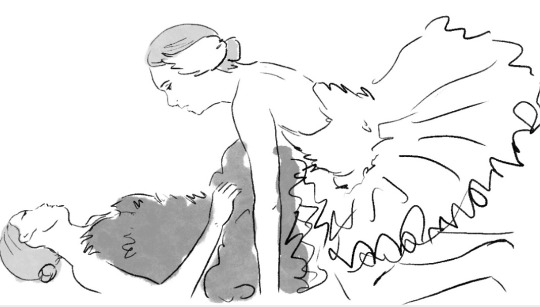
-Black Swan: It’s a new season and Lily, a dancer in the ballet who possesses similar physical attributes to Nina but embodies the effortless freedom Nina lacks, joins the troop. Nina has struggled for everything she has achieved. We see how regimented her life is, how micro-managed her eating is, and the physical toll ballet takes on her body. Whereas Lily comes in late and doesn’t need to warm up, even after a night of partying. She climbs up the ranks quickly with her magnetic ease.
Lily becomes all the more a threat when she is made Nina’s understudy. When Nina is late, she steps in and performs both parts in a way Nina could only dream of. Lily catches the eye of the director Thomas and the man playing the part of the Swan prince. Nina is more upset about Thomas, but she is frustrated because she has no chemistry with her prince whereas Lily does.

-Birdman: After Riggan’s co-star gets hit in the head with a stage light (maybe on purpose), Mike, (Edward Norton) is brought onto the project, injecting excitement into the crew and prospective audience. Mike is renowned in the business for eating, sleeping, and breathing “the stage.” Life is a stage to Mike, and he may just be full of shit, but he is what Riggan wants to be seen as.
Mike gets more interested in the project and even helps Riggan punch up the script, but it quickly becomes clear Mike is in it for himself. In the first preview Mike throws a drunken tantrum when Riggan takes away his real booze on stage. During the next performance Mike tries to have actual sex on stage with his girlfriend and has a very real boner for all to see in the last scene. He even steals Riggan's tale of why he's doing this play (a childhood encounter with Carver) and tells it in an interview.
The Antagonist:
Who is pushing our protagonist, and who doubts them?
-Perfect Blue: Mr. Mi-Mania is Mima’s biggest fan. When Mima makes the career change, he does not accept it and is encouraged by the “true Mima”(Pop Idol Mima) to save her from the industry folks pushing her on the new career path and tarnishing her image. He does this by murdering some of the people working around Mima.
-Black Swan: Thomas, the director, would have chosen Nina to be the star if she was only playing the white swan. Nina does sway Thomas to give her the role, but he relentlessly pushes Nina on and off the stage to give him the unrestrained performance he wants for the black swan.
-Birdman: The critic Tabitha Dickinson is the word in theater, with her opinion making or breaking a play. She loathes Riggan for thinking he can just waltz onto Broadway from playing a superhero in order to write, produce, and star in his own production. She vows to write a bad review regardless of what she sees opening night.
The Old You:
Perfect Blue and Birdman are more obviously similar because their “old self” was a very different public persona. Mima was a pop idol, and Riggan was a blockbuster superhero. They were so well known for these roles and the image associated with them that they struggled for their professional peers and fans to see them in a more serious light.
Nina is staying within her profession, but she is trying to make the move from being a girl in the chorus to playing the lead. And this year the lead ballerina must play two characters who are in stark contrast with each other. Nina is perfect for the innocent White Swan, but she must also embody the seductive Black Swan. Her colleagues are doubtful she can play the Black Swan, a temptress who steals the prince away. Her mother also wants to keep her in "White Swan Mode" as a completely codependent child, lamenting "What happened to my sweet girl?" at one point as Nina begins to rebel, exploring independence and sexuality.
-Perfect Blue: Pop Idol to actress.
-Black Swan: Chorus to star / White Swan to Black Swan.
-Birdman: Action movie star to stage actor.
The Death Bow:
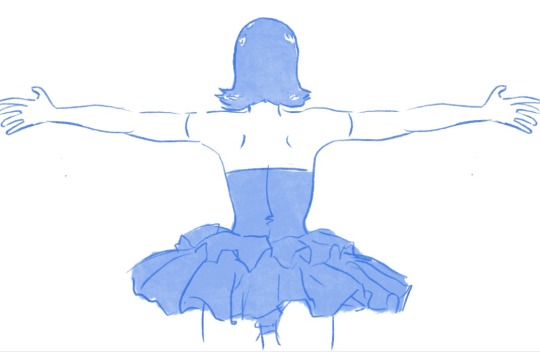
-Perfect Blue: Rumi, in full Pop Idol Mima delusion, hunts Mima down to kill her because there can only be one "Mima." After a brutal struggle in an alley, Rumi is stabbed in the stomach by a glass shard while retrieving her wig. Rumi then staggers into the streets and puts her wig back on. An oncoming truck's lights deceive Rumi into thinking she's in the spotlight with all her fans cheering. Envisioning herself as Mima, she joyfully soaks it in, before the real Mima pushes her out of the way to safety.
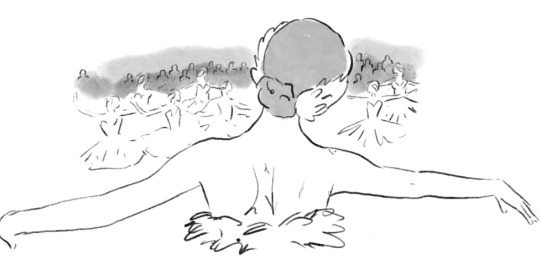
-Black Swan: Opening night, Nina performs the finale perfectly, but we see in the climactic moment before she dives off stage that the wound she inflicted on herself is very real and all the more fatal because of her strenuous final performance. After she dives onto the mattress everyone rushes to her side to congratulate her. The crowd cheers, and her colleagues come to congratulate her. They notice her injury and are distressed. Nina doesn’t care, she looks up into the stage lights, blissed out, everything goes white. Perhaps she is starting to pass out or die. The cheering continues.
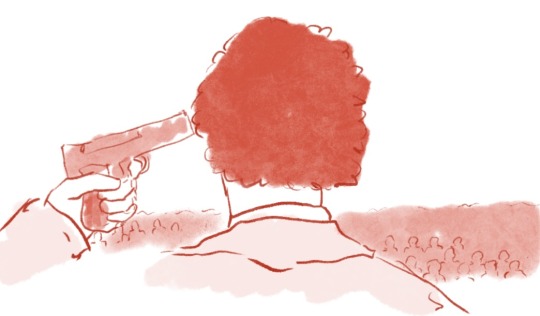
-Birdman: Riggan’s character Ed is in utter despair after breaking into his ex-wife's hotel room and finding her with another man. She says she doesn't love him anymore. Throughout rehearsals, Mike has pressed Riggan for realness, complaining about everything from the booze to the gun on the set being fake. On opening night Riggan has a real gun. Ed is supposed to turn the gun on himself, but Riggan hasn’t made up his mind on who to shoot yet. He feints shooting Mike, then the audience, but he settles on himself. The audience at first is blown away by his performance, giving him a standing ovation only to realize it's very real.
Mortal Wound:
All three protagonists are severely wounded. Nina and Riggan's "mortal wound" leads to their “death bow”, but in Perfect Blue it is Mima's “double/shadow-self” manager Rumi who is deluded in that final moment.
-Perfect Blue: Rumi tries to kill Mima, and stabs her in the side with an umbrella. Mima is only saved after tearing off Rumi's wig. Distressed, Rumi bends over broken glass to retrieve it, stabbing herself in the stomach.
-Black Swan: Nina tussles with Lily in her dressing room, thinking Lily is trying to take over the lead role. They shatter a mirror, and Nina stabs Lily in the guts with a big shard. However, it was all a hallucination: Nina stabbed herself. The show must go on, so Nina finishes the performance brilliantly. We don't know what happens to Nina afterward.
-Birdman: Riggan is supposed to pretend to shoot himself in the play, but on opening night he intentionally uses a real gun. This doesn't kill him, but in the hospital Riggan likely commits suicide by jumping out a window.
Hollowness Of Fame:
-Perfect Blue: The world of pop idols was just as critical of a woman's appearance and behavior as it is for actresses. The constant feedback from the public's expectations of who she is and should be almost causes Mima to completely lose her sense of self.
-Black Swan: All the girls in the troop want to be the prima ballerina and once Nina has this part she sees the dark and fleeting side of this coveted role through the character Beth. The audience wants someone new and fresh and when they are tired of you or you're considered too old, you are quickly cast aside.
-Birdman: Riggan is desperate for public recognition. How he wants to receive it has changed. It used to be through his blockbuster movies, but now he wants to be seen as a stage actor. He values fame over his relationships. In a scene where his ex-wife comes to talk to him about their daughter, Riggan gets sidetracked telling this story:
RIGGAN: The last time I flew here from LA, George Clooney was sitting two seats in front of me. With those cufflinks, and that... chin. We ended up flying through this really bad storm. The plane started to rattle and shake, and everyone on board was crying... and praying. And I just sat there-- Sat there thinking that when Sam opened that paper it was going to be Clooney's face on the front page. Not mine.
What Do You Really Want?:
The three protagonists are trying to achieve "greatness" in their career field, but what deeper need is this success trying to fill? What does the character actually want?
-Perfect Blue: Mima wants to find herself.
Mima doesn't start the film wanting this, but when she starts to lose her identity she realizes how important it is to her. The finale scene of the movie catches up with Mima sometime in the future. Her hair is longer and her clothes more fashionable and mature. She has just finished visiting Rumi, who rarely returns to that personality. Two nurses whisper that the person they see looks like the actress Mima Kirigoe, but that she has to be a look-a-like. Mima gets into her car, looks into the mirror, sees her reflection, and to the audience says, "No, I'm real!"
This is a hard-earned moment because Mima lost her sense of self. It was only until her final struggle with Rumi that she realized:
Rumi: We don't need two Mimas!
Mima: I AM MIMA!
Rumi: That's funny! Mima is a pop idol! You're just a dirty old impostor!
Mima: LIKE I CARE! I AM WHO I AM!!
Mima in this moment finally stops attaching her sense of self to her career.
-Black Swan: Nina wants to be perfect.
Nina starts the movie and ends the movie with this desire. When Nina finally ”kills" the part of her holding herself back and finds the black swan, she dances uninhibited and free as both the black and white swan, a performance unmatched. She takes her final leap as the white swan. This may be Nina's last performance because she has severely wounded herself. “It was perfect” is the last thing she mutters. Nina learns, tragically, what it takes to be "perfect."
-Birdman: Riggan thinks he wants fame and adoration, but it’s actually love.
Riggan is addicted to these two things. They are his biggest temptations to play Birdman again. Birdman is constantly pointing out which celebrities are doing superhero movies and how much money they are making. But Riggan resists, hoping to get the fame and adoration he craves through the theater instead, an art much more highly regarded. Before Riggan's opening night, his ex-wife points out that he confuses adoration with love. At the end of the film, in the hospital where Riggan is recovering from shooting himself on stage, he at last has the fame and adoration he was desperate to gain. However, it doesn't heal him because it’s not actual love.
Delusions:
Along with “seeing” their shadow self, each protagonist has another destructive delusion.
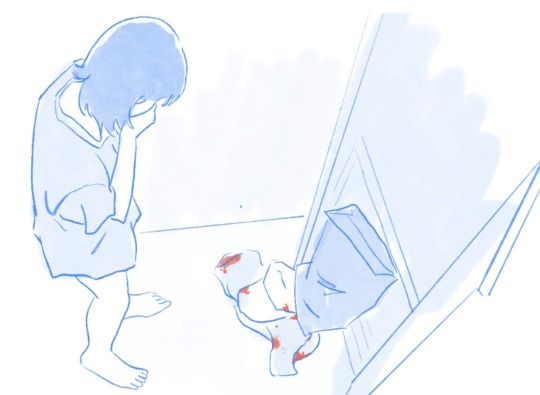
-Perfect Blue: The lines between the murders occurring in the show Double Bind and the actual deaths of those involved in the production get very murky. Is Nina dreaming she's killing people or is she actually the culprit?
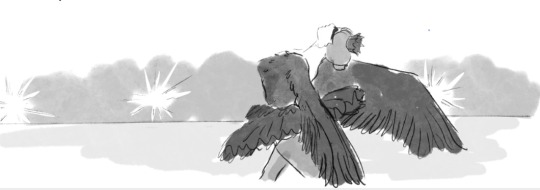
-Black Swan: Nina’s coping mechanism for the emotional and physical stress she endures is picking and scratching at her skin. As she loses control more and more, her picking becomes more intense and the reality of what's going on with her body gets murky. What starts as a little picking at a hangnail turns into Nina pulling the skin off down her finger. The itchy skin on her back turns into budding feathers. Is she turning into the black swan?

-Birdman: The opening shot of the film has Riggan sitting cross-legged in his underwear meditatively floating. Throughout the film Riggan imagines he has telekinesis, bringing objects closer to him and possibly making a light fall and injure the costar he wanted to get rid of. In one scene he runs off a rooftop and flies away, landing outside the theater. An angry cab driver yells at him to pay his fare.
My Music:
Our three protagonists have and are aware of their leitmotifs.
-Perfect Blue: Mima is going to make a special appearance with CHAM, but before the event she has a shoot with a photographer who presses her into a much more revealing session. This causes Mima a lot of distress, so Pop Idol Mima appears and says she’ll take over. She joins CHAM dressed in her frilly outfit and does the choreography and lip sync for "Angel of Love" (The CHAM song the movie opens with) instead of performing the actual song being played.
It’s a little different from the other two films, but Mima is synonymous with"Angel of Love." It’s also blasted on a boombox when the writer for Double Bind is murdered.
-Black Swan: Nina oversleeps for rehearsal and her mother doesn’t wake her up. When she arrives, she hears the white swan's music playing, commenting to herself “My music?” and is startled to see Lily has stepped in to perform her part. It wounds Nina to see another girl dancing to her music.
-Birdman: After Riggan spends a drunken night on the street he wakes the next morning to Birdman pumping him up. Riggan imagines he’s in a Birdman movie and blockbuster explosions and a giant bird robot appear in the background. He makes it to a rooftop and he cues the music by muttering “Music.” As his overture starts to play, Riggan, lost in his delusions, “flies” off the building.
Who You Could Become:
Should the character fail or lose their way, there is a reminder or warning of what their possible future could look like.
-Perfect Blue: Rumi, a bitter ex-pop idol turned agent who never got over her “failure” to make it to the top. Rumi projects herself on Mima, seeing her as everything Rumi had hoped to be. Rumi takes Mima's career change as a personal betrayal.
-Black Swan: Beth, the former Prima Ballerina whom Nina looks up to. She was Thomas's star, his "Little Princess," but the industry is cruel and women age out of "star" material quickly. Heartbroken by the forced ending of her career and loss of Thomas’ affection, Beth self-destructs.
Nina's mother is another glimpse at her possible fate. Her career was cut short because she got pregnant, but we don't know if she was ever on track to being a star. Nina's mother put all her energy and hope into her daughter's career as a ballerina, but also resents her successes.
-Riggan: There is not a specific character in Birdman who represents the fate that could befall him, but the threat of failure is just as present as in the other two films. Riggan’s play could flop, no one could take him seriously as a stage actor, he could lose all the money he invested, his daughter could lose even more respect for him, and he could become more of a has-been than ever.
A Sapphic Element:
Take this one lightly, but all three have it! Black Swan explores this in much more depth, whereas Perfect Blue’s and Birdman’s have it just kinda tossed in.

-Perfect Blue: During the initial scene discussion of Mima’s career change it starts with a clip of Mima acting. She is in bed, another woman in lingerie crawls towards her, and Mima then anguishes "I can’t do this!”
-Black Swan: Nina has been kept a child by her mother. As she dances the Black Swan more and more, she starts exploring her sexuality. While she is attracted to Thomas, she is also drawn to Lily. Does Nina want to be Lily or be with Lily? Nina even has a wet dream about the other girl.
Birdman: Laura, Riggan’s girlfriend and fellow actor, comments that their co-star Lesley has a perfect ass. After Mike tries to have sex with Lesley onstage, a distressed Lesly is comforted by Laura, who makes a pass at her which isn’t rebuffed.
Some Birdman and Black Swan only:
Birds:
A bit obvious, but Birdman and Blackswan both reference birds in their titles and stories.
-Black Swan: Nina is performing the story of Swan Lake, which is about a pure maiden who is transformed into a swan. Nina can easily play this part; her transformation is in embodying the black swan. Nina begins to have hallucinations that she is physically becoming the black swan throughout the film: pulling feathers out of her back, her legs bending wrong, and her neck growing into the shape of a bird's. When she finally finds the character in her performance, Nina envisions herself growing black wings, the transformation complete.
The narrative embraces the symbol of flight and freedom associated with birds. In one scene Riggen looks to be attempting suicide from the roof of a building, and we see him run off and fly away. He lives in the moment, soaring over the city and touching down in front of the theater. At the end of the film, Riggan does jump from his hospital window, but his daughter looks up to the sky and smiles as if he truly took flight. Also noteworthy: after Riggan shoots himself in the face, blowing his nose off, his face cast looks similar to his Birdman mask.
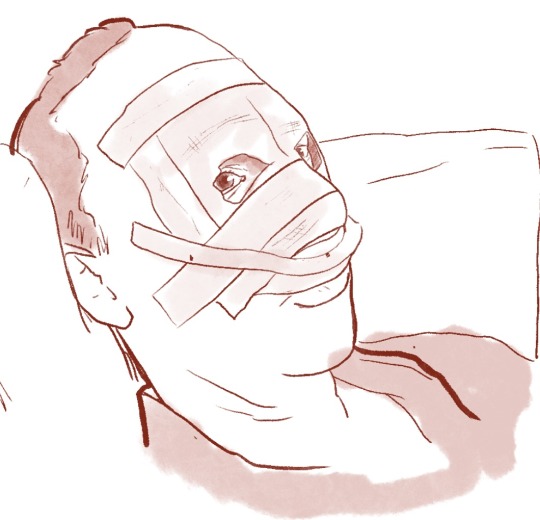
The Protagonist Catches Their Double Coping A Feel Backstage:
It’s their big night, but the double is having all the fun.
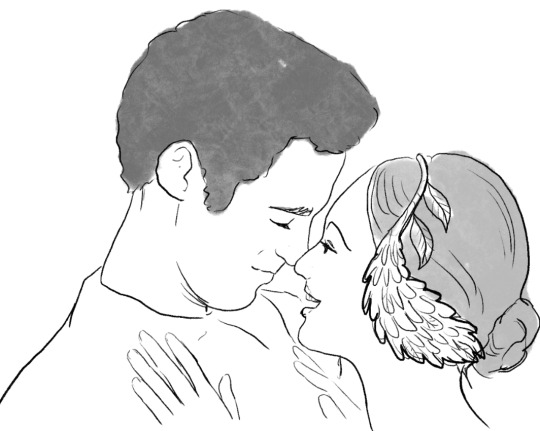
-Black Swan: It’s opening night. Nina and her Prince do an elegant performance together but as soon as they reach backstage the Prince immediately distances himself from her. There is no affection between them. While Nina waits for her next moment on stage she sees the Prince with Lily, and Lily cops a feel of his package.
-Birdman: Riggan is preparing to go on stage. He spies Mike coming to the back of the stage, Riggan’s daughter Sam in his arms. They are happy and at ease in each other’s arms, and they kiss.

Hope you enjoyed my little comparison! Let me know what ya'll think!
Thank you Cal for editing!
-Julia
#black swan#birdman#perfect blue#comparison#Darren Aronofsky#satoshi kon#movie comparison#essay#Alejandro González Iñárritu
49 notes
·
View notes
Text
Record of Ragarok chapter 88 thoughts with no particular order or sense
Beelzebub taking any chance to die is sending me
YES THOR SPEAK YOUR TRUTH KING!
Lü bu :' )
Zero :' )
Buddha and Beel are in good terms FOR NOW!
Buddha will go to the Underworld to meet Sigfried, it'd be cool if Sakata or even Loki but that ain't happening accompany him.
At first I thought the idea of bringing back the primordial god was for Odin to let chaos break loose and take the leadership of the gods in the end but if he needs to sacrifice himself for that then IDK maybe I'll make a theory about it later.
Was the close up of Anubis tonge necessary? Still he's cute
Lol Ares is shooked
I love the art style and the techniques in this fight but I can't help not being interested at all since I can already predict how it's going to end. Thank God there's the side plot but maybe the next chapter will finally delve into Susanoo's past
#record of ragnarok#shuumatsu no valkyrie#thor ror#ror thor#snv thor#okita souji#susanoo no mikoto#buddha ror#buddha record of ragnarok#beelzebub ror#beelzebub record of ragnarok#odin record of ragnarok#odin ror#snv susanoo#snv odin#snv buddha
20 notes
·
View notes
Note
please tell me the helsinki cha cha cha tram krista sigfrieds posted in her insta stories is for real, i am loving how your country is collectively losing its shit over this silly song 🤗😊
me too 😭😭😭 the outfits and decorations and support messages are EVERYWHERE, there's never been madness like this before 🥺
unfortunately I haven't been in Helsinki for a week now, Finnish moots please help me out here: is the Käärijä tram real? 😄💚
102 notes
·
View notes
Note
i always filter out ships on ao3 but for mechs i leave aurora/nastya in because i love them. and also its one of like 3 romances i can tolerate (one of the other 2 is sigfried/the odette)
Aurora and Nastya are just so good to me I love them
#I’m a ship girlie myself but I understand it’s not everyone’s cup of tea#the mechanisms#the mechanisms band#the mechs#the mechs band#nastya rasputina#the starship aurora
10 notes
·
View notes
Text
TLK Christmas - Christmas with Erik
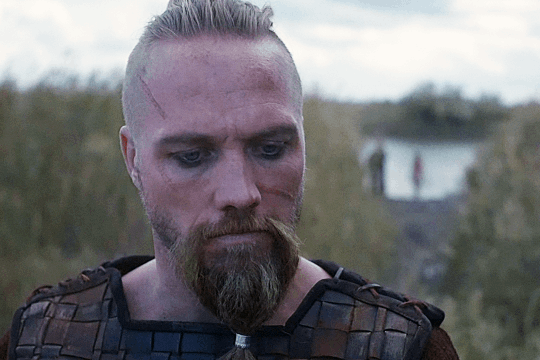
You go to your tippy toes to hang an ornament somewhat higher up place on the Yule tree. But you still can't reach the spot you are aiming for.
You feel two strong hands grab you by the hips and lift you up. You squeal and then giggle happily as you can reach the right spot.
Once you've hung the ornament, you look down. Erik grins up at you.
"Hello there, beautiful." Erik murmurs. He gently puts you back down on the floor. But he does not let you go. Instead he pulls you closer.
"Are you having a good time?" He asks gently. "Now that you are here, yes I am." You cooe.
Erik grins and kisses your cheek. "I am very glad you are having fun." He murmurs. You turn a little in his arms and cuddle your face into his chest. Erik laughs sweetly and presses a kiss atop your head.
"How about some mulled wine." He suggests. "I would love that." You answer.
Erik takes you inside the great hall.
He orders a serving wench to fetch mulled wine and brings you to the table on the dais.
It is a place you don't often sit at, as Erik and Sigfried prefer to sit among their men. And you prefer to sit with Erik.
The servant brings mulled wine and fresh bread to the dais. Erik gently thanks her. He's always gentle, even to the servants. It is one of the things you adore about him.
There is so much about him that you love. But his odd gentleness has your heart fluttering every single time you behold it.
"A toast, to us." Erik raises his cup. "To us." You agree. You both sip your wine and then lean your foreheads together.
"Happy Yule, my love." Erik whispers, before he tilts his head a little and presses his lips against yours.
45 notes
·
View notes
Text
Welcome to my ted talk. Let's see how long y'all can hold out.
Today i will be introducing you to one of my personal favorite books of quite litrally all time. I want to talk about Nibelungen.
The Saga of the Nibelungs dates back to the fifth century and is often considered to have its main historical core or point of reference in the destruction of the Burgundian Empire, then ruled by Gundahar, in the area around Worms in late antiquity (around 436) by the Roman army commander Aëtius with the help of Hunnic auxiliaries.
Since the oral tradition of such historical events is often subject to modifications and embellishments and the material has been extensively fleshed out in poetry, the Saga of the Nibelungs probably preserves hardly any authentic historical memories.
The book that will be discussed below, the Song of the Nibelungs, is a medieval heroic epic that was first written down in the thirteenth century and passed on from there.
In the nineteenth and later in the twentieth century, the Song of the Nibelungs was regarded as the national epic of the Germans and the hero of the story, Sigfried, was considered a national hero.
The original version of the Song of the Nibelungs was written in Middle High German, which was spoken from around 1050 to 1350.
The Nibelungenlied itself is actually a song, written in four verse stanzas. However, the melody to which it was sung is unknown today. The entire song consists of around 2400 stanzas and is divided into 39 aventures, or chapters. Furthermore, it consists of two parts.
Uns ist in alten mæren wunders vil geseit
von helden lobebæren, von grôzer arebeit,
von freude un hôchgezîten, von weinen un klagen,
von küener recken strîten muget ir nû wunder hœren sagen.
This is the first stanza of the Song of the Nibelungs. (Middle High German is a bitch to read, truly, but the translation into modern German feels too stiff.)
Also, have this:
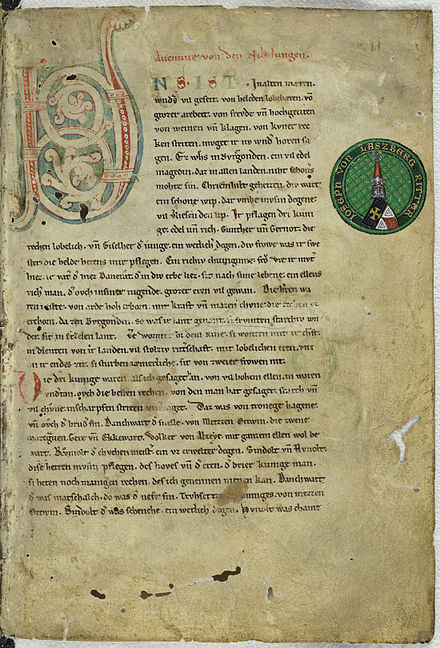
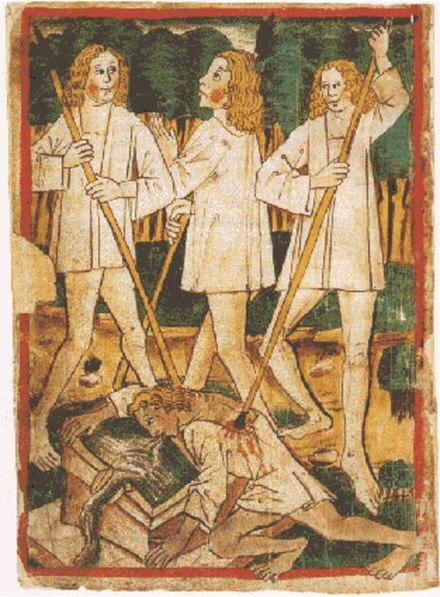
(1220-1250) (1480-1490)
Now, a more or less short summary of the content. So, spoilers, I guess? But I don't think there are any translations.
Part 1
In the first part of the Song of the Nibelungs, the marriage between Kriemhild and Siegfried takes centre stage. Kriemhild has a dream in which she raises a falcon that is torn to pieces by two eagles. According to Kriemhild's mother Ute, the falcon symbolises a man whom Kriemhild will tragically lose.
The king's son Siegfried of Xanten hears of Kriemhild's beauty and falls in love with her without ever having seen her. He therefore sets off for the court of the Burgundians to marry Kriemhild. Siegfried is the son of the King of Xanten on the Rhine and is very famous because he once killed a dragon and bathed in its blood. Since then he has been invulnerable.
Kriemhild's brother Gunther wants to marry Brünhild, the queen of Iceland. But he needs Siegfried's help to do so. For Brünhild will only marry the man who can defeat her in three battles. In return, Gunther promises him marriage to Kriemhild. With Siegfried's help, Gunther manages to defeat Brünhild. A double wedding takes place between Gunther and Brünhild and Siegfried and Kriemhild.
Soon afterwards, the two queens fall out. They cannot agree on who has the higher rank. As a result, Brünhild and her henchman Hagen von Tronje plan an intrigue: Hagen kills Siegfried during a hunt. This is because Siegfried has a vulnerable spot on his back that was not covered in dragon blood at the time. After Siegfried's death, Kriemhild is inconsolable and swears revenge.
Part 2
The second part takes place 13 years after Siegfried's death and begins with Kriemhild's marriage to the Hun king Etzel in Hungary. Another 13 years later, Kriemhild persuades Etzel to invite her brothers and Hagen to Hungary. Although the Burgundians are suspicious of the invitation, they eventually accept it. Gunther and Hagen travel to the court of the Huns with a large entourage.
Once at court, Hagen refuses to lay down his weapons. This is seen as a great insult to the host. After some provocations on both sides, a battle finally breaks out between the Huns and the Burgundians. In the end, almost all of the Burgundian followers are killed. Gunther and Hagen are tied up.
Kriemhild has Gunther killed. In revenge for Siegfried's murder, she then beheads Hagen herself. She herself is then slain by a henchman. The Song of the Nibelungs ends with the narrator's lament that love always leads to suffering.
For better understanding, a constellation of the main characters: (cw, messy handwriting, slightly uncanny sketches)
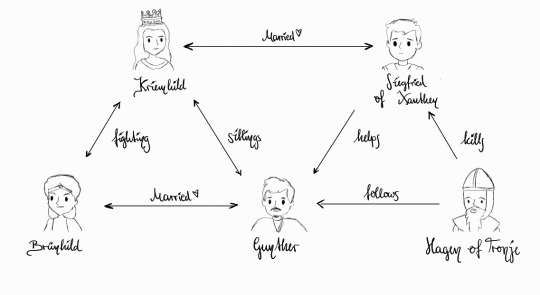
If you've made it to here, thank you for reading my ramblings <3
3 notes
·
View notes
Note
Is there any doubt what ACGAS are using as a model for their slow burn romance sub-plot? Blustering, loud male leads with daddy issues, war baggage, lost wives, troubled “children” relationships, smart, effective at their job, selfish, a cad reputation with no actual game, saved by housekeepers who secretly run their lives, complicated class / employer / employee relationship with said housekeepers (who have their own war baggage, lost spouses, fractured relationships with their own children, are the secret brains behind everything, serve sarcasm and sass as a side to their fab cooking, and patiently put together these troubled men until they are worthy of loving them back), patriarchs / matriarchs of found family, appreciates beauty of housekeeper wife with dramatic dress reveal, favors a 3 piece suit and rocks a ginger beard. If Siegfried and Audrey finally kiss and Robert Hall shows up at the door with tte ghost of Mei Lin, I’d be like “this tracks”.
It's literally the exact same story and I think Robert Hall is definitely showing up at the door the minute Sigfried declares his love. ACGAS should be paying George Adams royalties.
But hey, I loved the story the first time I am happy to watch it again.
15 notes
·
View notes
Text
Got back from EVO! Had a really good time!
I entered Tekken 7 and Soulcalibur 6, which was a side game. I went 4-2 in Tekken, which was pretty alright! I was a little bit salty though because I got double-jeopardy'd by the same player! I lost my first set to this guy, and then the match to get out of the pool was against him too. So I lost to the same dude twice, and I had scouted him out and specifically practiced against his character and knew which Kuma costume he would pick, and still lost to him twice :-\ Unfortunate.
But! 4-2, not bad! I played pretty alright overall -- I did hit some specific anti-Kuma stuff, and I roughed up the other players pretty convincingly. Hit good combos and good setups (3xEWGF in tournament, as a whiff punish! the electrics were crispy -- also the patented Unblockable At The Wall).
For Soulcalibur, I went 0-2, which was a very slight bummer. But I played my first set on stream (I'll share that shortly), and I had a great time while getting roughed up by a Nightmare player. I was having fun and hit some good combos and did my dumb Raw Unblockable As Oki setup. And it worked, twice! On stream!! For my second match, I lost to a Sigfried, but it was close. Friendly dudes, both!
Outside of competition, I played about a zillion casual sets for fun, both in the venue and after-hours in the hotels, and saw so many friends from NorCal, from the Internet, from previous EVOs! The casual sets were fun, and I fought people both rather newer than me, and also people who completely bodied me. Both in Tekken 7 and old games on the arcade cabinets in the arcade cab area.
I met a bunch of new people too! So many people at FGC events want to talk to you -- just be like "hey, how's your weekend going?" and they'll tell you about what games they're playing, and you'll be able to relate! Old heads will want to tell you about whatever it is they know, new players bring that new-player enthusiasm... it's all good, and we all share this beautiful love of fighting games.
Wore my good N95s pretty much the whole time (unless eating) and I'm pretty sure I didn't get sick! EVOla is real, and has been even before COVID, but I think it worked out this time!
EVO's a great time! It's especially good if you already know people, but you know what? You already have a lot in common with FGC folks if you love fighting games.
Can strongly recommend <3 Come on out to locals, come on out to big events like your EVOs and your Combo Breakers and etc. Play fighting games with fighting games people, it's pretty hype!
4 notes
·
View notes
Text
Wip Wednesday
Slann Diego Rhumbadrés
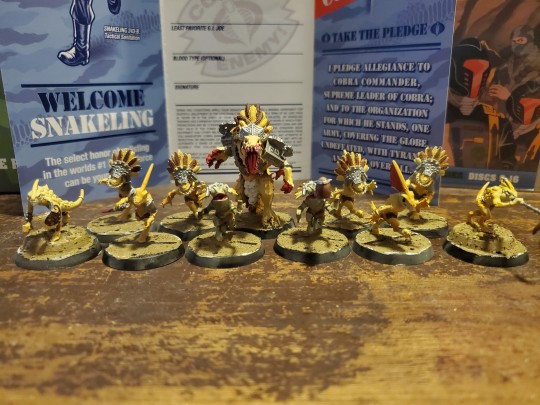



Here they are. I got the whole Team Gridiron (Tabletop) ready (Minus the snake swarm mascots, they still require a little more work).

I also finished the Skink Cheif Coach/Reff


The Spear counts as a Red and Yellow Card (depending on which end he stabs/clubs you with)
His eyes are supposed to be pure black, like the Kroxigor, to show his bloodlust... Like a Shark.
My next Project is my Full Size Nobility Team;
The Totengrad Tyrants.
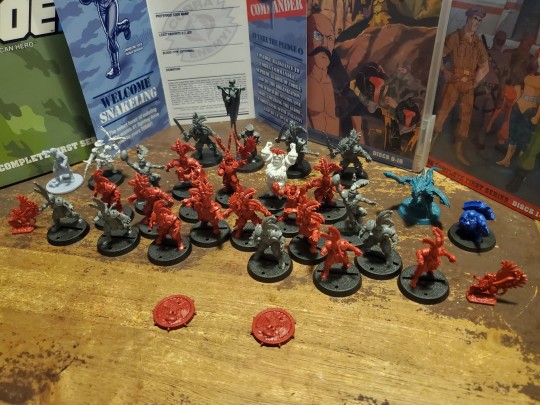
On the Second to the Right (of the picture below) we have Lord Baron Sigfried Von Totenkopf. The Tyrant Himself, second to the left we have his Bride, Baroness Zerlina Totenkopf (her Maiden Name is Gargantbreaker). The others pictured are the Team Mascot(s); the Totengrad Color Guard.

Baron Sigfried is a Griff Oberwald model, but I plan to run him as a Noble Blitzer or as Griff, depending on whether I can afford Griff for the game. So he's gonna be run as a Blitzer most of the Time. Baroness Zerlina is the Team Ogre.
The Lore for this is that Baron Sigfried's Father, the Late Baron Sigwald Von Totenkopf, Negotiated with Baroness Zerlina's Father, the Cheif of her Ogre Mawtribe, to recruit the Tribe as mercenaries to bolster Totengrad's Defense. The Pact was made and sealed with an arranged marriage between Young Sigfried and Huskard Jorl Zerlina. For Sigfried, the first time he ever laid eyes of his bride's Face was at the alter (before she got married she wore the helm of a Chaos Warlord that she had slain in battle, and never took it off until they said their "I Do"s). And it was Love at First Sight. For Zerlina, she was mildly indifferent to the whole affair, but the Baron's genuine affections, as well as his numerous gifts of Primium Victuals both Savory and Sweet, swiftly endeared him to her. Such is that now a days their love is mutual and their Union is one of wedded bliss.
I also plan on working on a couple more Reffs and some Apothecaries

#art wip#wip#wip wednesday#warhammer#blood bowl#warhammer fantasy#homebrew#homebrew lore#Slann Diego Rhumbadrés#The Totengrad Tyrants#Lord Baron Sigfried Von Totenkopf#Baroness Zerlina Totenkopf#referee#blood bowl referee#apothecary#blood bowl apothecary
1 note
·
View note
Text
Dona Flor and Her Two Husbands
Certain films have the power to transport an audience, enticing us to leave the theater and book the next flight to its desirable location. Bruno Barreto's Dona Flor and Her Two Husbands is one such film, and in 1978 it captured the imagination and heart of international audiences as it still does today. "When I make films, I think it's essential to make them very specific and unique about where they take place, and at the same time, I want to make sure that international audiences will get it. So that's a significant concern for me," said Barreto, who grew up in Brazil watching American and European movies. "I felt transported, like I was in the American west, in Paris or the French countryside when watching a Truffaut film, or in Rome or Milano or Naples watching a Pietro Germi film. So, I always wanted my audience to feel the same way.
Dona Flor's backdrop is Pelourinho, the historical center of Salvador, Bahia, in the northeast of Brazil, and many scenes are shot in its colonial squares and buildings. Dona Flor's home in the movie is so iconographic that cineaste tourists still seek out its precise location. Barreto has said, jokingly, "There was only one thing I couldn't get on film, which is the aroma of Bahia and Flor's cooking." In addition to his eye for location, Barreto augments each scene with soundtracks by Brazil's musical giants. In the case of Dona Flor, he used Chico Buarque; and in his 2000 film Bossa Nova he used, of course, Tom Jobim.
Barreto was twenty years old when he directed Dona Flor, which is based on the novel by Jorge Amado. When initially released in Brazil in 1976, Dona Flor became numbers only topped thirty-five years later. Released internationally in 1978, Dona Flor received nominations for a Golden Globe and a BAFTA Award, and in the US. it held its rank as the highest-grossing Brazilian film for over twenty years.
As a love story, Vadinho and Flor's passion is the incarnation of the sacred and the profane. The beauty of the film rests in the fact that its eroticism is simultaneously imagined and real. This is primarily due to the extraordinary form of glamour embodied by a young Sonia Braga as Dona Flor. As in the novel, Barreto's film plays with the juxtaposition of the solid middle-class customs of Salvador, Bahia, which Flor inhabits in the 1940s, and the licentiousness of the blond malandrinho (a naughty but appealing guy) Vadinho, portrayed by José Wilker. Murilo Salles' camerawork floats between the two principal characters, and, at some point, the viewer realizes that Vadinho is the camera at those times when we see the scene through the dead man's eyes. The visual virtuosity of the cinematography creates a distinct presence that the audience is privy to. Observing Dona Flor through the lens of her immense grief, the viewer is transported into a romantic space of epic proportion. Seduced, we can offer no resistance to their passion, even though we know it is a total fantasy.
The German cultural critic Sigfried Krakhauer once stated, "Photography is the redemption of physical reality." This has never been more accurate than in this film, and Barreto's relationship to photography is not accidental. He has said he was a photographer first and had to start directing his films in order to have the chance as a cinematographer. Much has been made of Barreto's young age when he made Dona Flor, his third feature film. For a director, like Barreto, who helmed his first feature at seventeen, a youthful vocation often suggests that the budding recipient now has a full-time job and a career path to pursue. But perhaps even more interesting is that the late teenager experiences a nascent identity and sense of self that comes through in this early work.
Color is the lingua franca of Brazilian culture. The film's authenticity is reinforced by its color palette; the distinctive colors of Salvador's colonial walls, tiles, cobblestone streets, and churches, are beautifully rendered by cinematographer Murilo Salles' poetic lens. This new digitally restored version has augured well for Dona Flor and has a consistency that enhances the framing, composition, and internal dimension of the entire drama and its characters. Movies on analog raw stock, shot on film, often benefit from enhancing digital technology. Colors long since faded come back to life, bringing an extraordinary contemporary sensibility.
The art direction and costumes by Anísio Medeiros contribute to the narrative of Flor's transformation from an inhibited woman of the 1940s into the passionate partner of the scoundrel Vadinho. Braga's body adds a sensuality to the bourgeoise styles of the time and to her widow's weeds. Towards the film's ending, when Dona Flor attempts to exorcize Vadinho from her life, she wears an ethereal pink organza robe. The robe's transparency echoes his corporeal disappearance as his spirit returns to the dead. This scene is the only time we see her clothed while having sex with Vadinho after his death, and it lends a considerable erotic charge.
Two religions, Candomblé, based on the West African Yoruban religion brought to Brazil by enslaved people, and Catholicism, are featured prominently in the film. The book's author, Jorge Amado, frequently refers to Candomblé's rituals and beliefs. Amado was proud to hold the title of Oba at the candomblé Ilè Axé Opô Afonjá, in Bahia. According to Barreto, "We are the largest Catholic country in the world. So, sex, and sexuality, is like a ghost. Very, very hidden and disguised, but very strong precisely because of that. And very potent." As previously mentioned. the film is set in the historic center of Salvador, Bahia, a UNESCO World Heritage site sometimes called the city of a thousand churches. As the first capital of Brazil, from 1549 to 1763, Salvador de Bahia is famous for its syncretism of Portuguese Catholicism with African Candomblé. Therefore, it is not surprising when Flor, wracked by quilt over her otherworldly affair with her dead husband, seeks help from her priest AND a Candomblé priestess. She asks her friend, the prostitute Dionísia, for a ceremony to be performed to exorcise Vadinho. The priest is useless, whereas the Mãe de Santo, the head of the Candomblé house, is entirely familiar with the problem, and is successful, until a bereft Flor calls Vadinho back into her arms. Of note are the authentic renderinas of this Candomblé house and its ceremony. Adding a healthy dose of religious cynicism is a scene where the obsessed gambler Vadinho goes to the church attempting to cage a loan from the priest Dom Venâncio.
While not an overtly political film - with a book by Jorge Amado and a soundtrack by Chico Buarque - love. loss. and death as a metaphor for exile cannot help but be an underlying theme. As a young man, Barreto was a part of a generation listening to Tropicalia. Some of its major musical artists, Caetano Veloso, Gilberto Gil, and Chico Barque, left Brazil in the late 1960s after the military dictatorship's Act Number Five, which eventually led to institutionalizing torture and repression. The novel Dona Flor and Her Two Husbands was published in 1966, but the story takes place in the 1940s. As a communist militant, Jorge Amado left Brazil for Argentina and Uruguay from 1941 to 1942. In the famous song written for the film, O Que Será, Chico Barque's Iyrics transform his leaving Brazil and his criticism of the dictatorship into a song that expresses Flor's pain and longing. Barque transfigures Flor's love and loss into a larger picture of the human condition - speaking of religion, government, and the people of the streets - the prostitutes, poets, prophets, and lovers.
Carnival is a festive Catholic season that occurs before the liturgical season of Lent and the resurrection. As a communist in his youth, Jorge Amado saw the Brazilian Carnival as a suppression of the masses, and he starts the novel with a descriptive carnival scene. The film's opening carnival scene of singing men dressed as women signals that a delightfully libertine experience lies in store for the audience.
An enormous tension is created between the sexy, beautiful Sambista in gold, signifying the rhythms of life, just as the main character dies of debauchery. The dancer stays in the center of the screen, continuing to writhe over his body. Following the titles and credits, the carnival dance resumes as the camera floats over the revelers in the street to the open window of Dona Flor's house, where we see the pale and very dead Vadinho lying in his coffin. And off we go, transported by the film into the libidinous mind of the beautiful young Dona Flor.
After this spectacular overture, our characters settle into quotidian life. However, Vadinho, who goes out every night, feels he can continue his relentless pleasure- seeking fortified by the comforts of the fine meals cooked by Flor. He forces her to stay at home, and she runs her profitable culinary school, which funds his gambling. Vadinho was based on one of Amado's real-life friends, who he says used "to lose money and win women." Halfway into the film and tired of grieving over Vadinho's untimely death, the young widow Flor finds herself in the position to marry the socially solid pharmacist, Dr. Teodoro Madureira (Mauro Mendonça). However, she soon becomes bored with her new husband's conventional lovemaking. She calls back the phantom of Vadinho, and the sexual sparks fly across the screen with even greater intensity than before. Eventually exhausted by Vadinho's constant appearance and feeling guilty about his ridiculing of her square husband, Flor is at her wit's end. The film's final scene, whose international poster image has become synonymous with the film, shows Sonia Braga walking out of the church, arm in arm with her new husband and a naked Vadinho, who, as they turn, has his hand on her... The End.
MARY JANE MARGASIANO is a New York-based programmer, producer, and costume designer for films, theatre, and dance, working extensively in Brazil. She is the Director of Strategic Partnerships at Cinema Tropical, a 501 (c) (3) non-profit media arts organization presenting Latin American cinema in the United States and co-curated their 2019 Brazilian film series "Veredas: A Generation of Brazilian Filmmakers" with Film at Lincoln Center.
#Film Movement#Cinema#Brazil#Classic#Sônia Braga#José Wilker#Mauro Mendonça#Jorge Amado#Bruno Barretto#Chico Buarque
18 notes
·
View notes
Text
Is it weird to say I want Wonder Woman to get a daughter...but that I don't care if she's married or not?
Like, granted she has two great love interests in Steve and Sigfried (who themselves have sexual tension) but I can take or leave Wondey getting back out there romantically.
5 notes
·
View notes